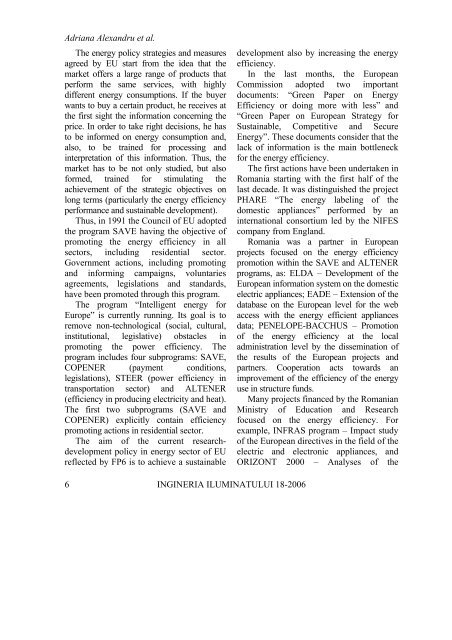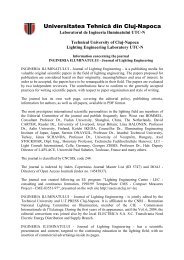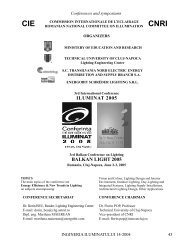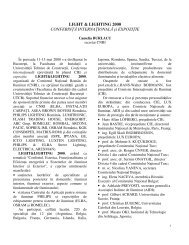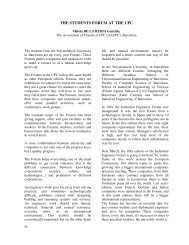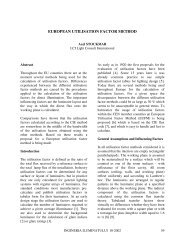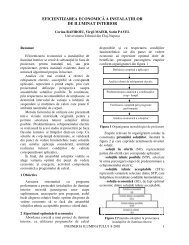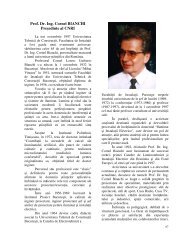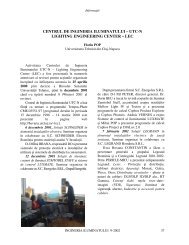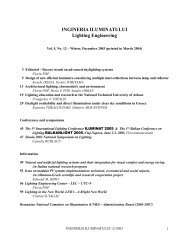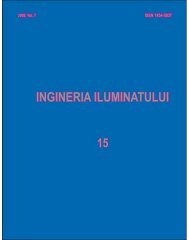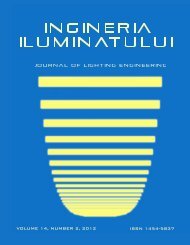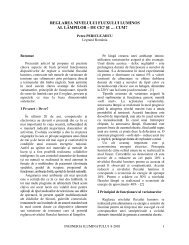This issue is sponsored by the Philips Romania, Lighting Division
This issue is sponsored by the Philips Romania, Lighting Division
This issue is sponsored by the Philips Romania, Lighting Division
You also want an ePaper? Increase the reach of your titles
YUMPU automatically turns print PDFs into web optimized ePapers that Google loves.
Adriana Alexandru et al.<br />
The energy policy strategies and measures<br />
agreed <strong>by</strong> EU start from <strong>the</strong> idea that <strong>the</strong><br />
market offers a large range of products that<br />
perform <strong>the</strong> same services, with highly<br />
different energy consumptions. If <strong>the</strong> buyer<br />
wants to buy a certain product, he receives at<br />
<strong>the</strong> first sight <strong>the</strong> information concerning <strong>the</strong><br />
price. In order to take right dec<strong>is</strong>ions, he has<br />
to be informed on energy consumption and,<br />
also, to be trained for processing and<br />
interpretation of th<strong>is</strong> information. Thus, <strong>the</strong><br />
market has to be not only studied, but also<br />
formed, trained for stimulating <strong>the</strong><br />
achievement of <strong>the</strong> strategic objectives on<br />
long terms (particularly <strong>the</strong> energy efficiency<br />
performance and sustainable development).<br />
Thus, in 1991 <strong>the</strong> Council of EU adopted<br />
<strong>the</strong> program SAVE having <strong>the</strong> objective of<br />
promoting <strong>the</strong> energy efficiency in all<br />
sectors, including residential sector.<br />
Government actions, including promoting<br />
and informing campaigns, voluntaries<br />
agreements, leg<strong>is</strong>lations and standards,<br />
have been promoted through th<strong>is</strong> program.<br />
The program “Intelligent energy for<br />
Europe” <strong>is</strong> currently running. Its goal <strong>is</strong> to<br />
remove non-technological (social, cultural,<br />
institutional, leg<strong>is</strong>lative) obstacles in<br />
promoting <strong>the</strong> power efficiency. The<br />
program includes four subprograms: SAVE,<br />
COPENER (payment conditions,<br />
leg<strong>is</strong>lations), STEER (power efficiency in<br />
transportation sector) and ALTENER<br />
(efficiency in producing electricity and heat).<br />
The first two subprograms (SAVE and<br />
COPENER) explicitly contain efficiency<br />
promoting actions in residential sector.<br />
The aim of <strong>the</strong> current researchdevelopment<br />
policy in energy sector of EU<br />
reflected <strong>by</strong> FP6 <strong>is</strong> to achieve a sustainable<br />
6<br />
INGINERIA ILUMINATULUI 18-2006<br />
development also <strong>by</strong> increasing <strong>the</strong> energy<br />
efficiency.<br />
In <strong>the</strong> last months, <strong>the</strong> European<br />
Comm<strong>is</strong>sion adopted two important<br />
documents: “Green Paper on Energy<br />
Efficiency or doing more with less” and<br />
“Green Paper on European Strategy for<br />
Sustainable, Competitive and Secure<br />
Energy”. These documents consider that <strong>the</strong><br />
lack of information <strong>is</strong> <strong>the</strong> main bottleneck<br />
for <strong>the</strong> energy efficiency.<br />
The first actions have been undertaken in<br />
<strong>Romania</strong> starting with <strong>the</strong> first half of <strong>the</strong><br />
last decade. It was d<strong>is</strong>tingu<strong>is</strong>hed <strong>the</strong> project<br />
PHARE “The energy labeling of <strong>the</strong><br />
domestic appliances” performed <strong>by</strong> an<br />
international consortium led <strong>by</strong> <strong>the</strong> NIFES<br />
company from England.<br />
<strong>Romania</strong> was a partner in European<br />
projects focused on <strong>the</strong> energy efficiency<br />
promotion within <strong>the</strong> SAVE and ALTENER<br />
programs, as: ELDA – Development of <strong>the</strong><br />
European information system on <strong>the</strong> domestic<br />
electric appliances; EADE – Extension of <strong>the</strong><br />
database on <strong>the</strong> European level for <strong>the</strong> web<br />
access with <strong>the</strong> energy efficient appliances<br />
data; PENELOPE-BACCHUS – Promotion<br />
of <strong>the</strong> energy efficiency at <strong>the</strong> local<br />
admin<strong>is</strong>tration level <strong>by</strong> <strong>the</strong> d<strong>is</strong>semination of<br />
<strong>the</strong> results of <strong>the</strong> European projects and<br />
partners. Cooperation acts towards an<br />
improvement of <strong>the</strong> efficiency of <strong>the</strong> energy<br />
use in structure funds.<br />
Many projects financed <strong>by</strong> <strong>the</strong> <strong>Romania</strong>n<br />
Min<strong>is</strong>try of Education and Research<br />
focused on <strong>the</strong> energy efficiency. For<br />
example, INFRAS program – Impact study<br />
of <strong>the</strong> European directives in <strong>the</strong> field of <strong>the</strong><br />
electric and electronic appliances, and<br />
ORIZONT 2000 – Analyses of <strong>the</strong>


